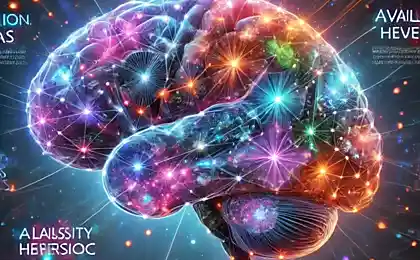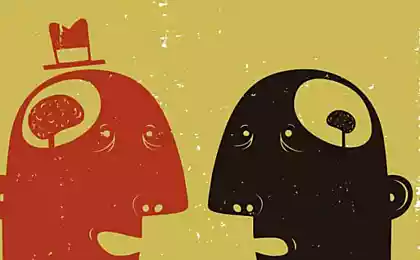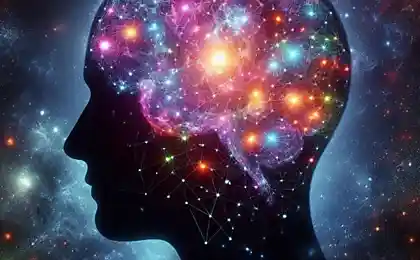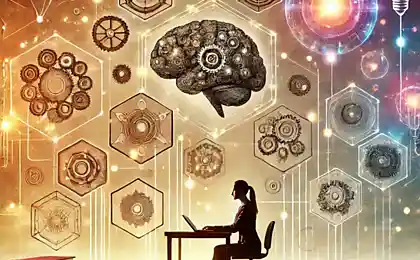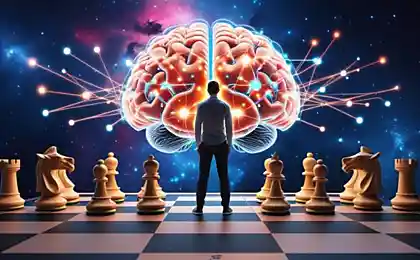581
Bugs thinking

9 errors of knowledge, distorting our realnost.Kognitivnye distortion - are errors in human thinking, a kind of logical traps. In certain situations, we tend to act according to the established patterns, even when we think that we proceed from common sense.
We suggest you avoid common pitfalls 9, which deprive us of objectivity.
Effect rifmyMy subconsciously tend to believe almost any judgment more reliable if it is written in rhyme. This effect is confirmed by numerous studies, where a group of people were asked to identify their level of trust in various rhymed and unrhymed phrases. The proposals contained rhymes are much more attractive for the test and cause them more confidence. For example, the phrase "What soberness conceals, alcohol brings" recognized more convincing than the argument "Sobriety hides that detects alcohol." The effect can be triggered by the fact that the rhyme facilitates cognitive processes and permanently binds in our subconscious seemingly disparate parts of the proposal.
Effect yakoryaMnogie first people use them in the eye-catching details and make further conclusions about something just based on it. Once a person has "set an anchor," he pronounces the following judgment, not trying to look a little further conditional "parking space". If the test offer five seconds to estimate the approximate result Math 1 × 2 × 3 × 4 × 5 × 6 × 7 × 8 =?, Then for lack of time most people will multiply the first few numbers and saw that the figure turned out not too big, It will announce a modest outcome (average response - about 512). But if the sequence of the factors reversed 8 × 7 × 6 × 5 × 4 × 3 × 2 × 1 - the subject, to make the first few steps and seeing the result of the multiplication gets more significantly increase their forecasts for the final response (average response - about 2,250). The correct result of multiplication - 40 320.
Heuristic dostupnostEsli ask a college student: "In your school learns more students from Colorado or California?" - That his answer will most likely be based on the personal example he can recall in a short period of time. The easier we can remember something, the more we trust this knowledge. If you ask a person a question: "We took a random word: do you think it likely would begin with the letter K or letter is in it third one?" - Most people much faster remember words beginning with K, and not words, where K - the third letter, and give your answer based on this. In fact, the standard text contains twice as many words, where K is the third.
Stockholm Syndrome pokupatelyaChasto consciousness retroactively ascribe positive qualities of the object, which people have already chosen and purchased and refuse which can not. For example, if you bought the computer of Apple, then you probably will not notice or significantly downplay the shortcomings of the company's computers and, conversely, increased markedly critical of computers based on Windows. The buyer will be in every way to justify an expensive item bought, unaware of his shortcomings, even if they are significant, and his choice does not meet his expectations. The same syndrome explains the purchase on a "me in this will be much better when I grow thin».
PrimankiEsli effect before the consumer has a choice - to buy cheaper and less capacious player A or is more expensive and a bigger player B, who will prefer a device with a higher capacity, and someone - a low price. But if the game takes the player C, which is more expensive than A and B, and has more memory than A but less than B, then the very fact of its existence, it increases the chances of buying the player B and making it a favorite among these three . This is due to the fact that the buyer will see that the model with a large storage capacity can be smaller, and it subliminally effect his choice. The sole purpose of these baits - minded person in favor of one of two options. This scheme is valid not only in marketing.
Effect IKEAPridanie undue weight to things, in the creation of which involved the consumer himself. Many of the items produced by the furniture store IKEA, require the buyer to build at home, and it is no coincidence: the user appreciate the product more, when it considers the result and their labor. Experiments have shown that people are willing to pay more for the thing assembled itself than the thing that does not need to assemble, and considers it a high quality and reliable.
"Hot - cold" biased assessment of reality arising from the inability to present itself in a different state and to predict their behavior in a situation associated with this condition. For example, when a person is hot, it is difficult to understand the beauty of coolness, and when he is madly in love, he can not remember how to live without the object of passion. Such short-sightedness leads to rash actions: until we are faced with a really serious temptation, it seems to us that this was not so hard to resist.
Functional fiksatsiyaMentalny unit against the new approach to the subject: a paper clip - for fastening sheets, hammer - to hammer a nail. This distortion does not allow our minds to move away from the original purpose of objects and see their possible extras. A classic experiment confirming this phenomenon - an experiment with a candle. Participants were given a candle, a box of matches and office keys and asked to attach the candle to the wall so that it does not drip on the table. Few participants can "rethink" the box with buttons, make her stand for candles, and not try to attach the candle to the wall using the buttons themselves.
The belief in a just world is quite positive tendency to hope for the best, there is a darker side: since people are very hard to come to terms with the fact that the world is unfair and full of coincidences, they are trying to find the logic in the most absurd and terrible events. That, in turn, leads to a bias. Therefore, victims of crime are often accused by their actions that they have contributed to such behavior by the offender (the classic example - an approach "is to blame" for victims of rape).
via theoryandpractice.ru/





